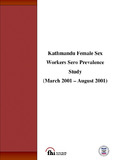Please use this identifier to cite or link to this item:
https://hdl.handle.net/20.500.14356/701| Title: | Kathmandu Female Sex Workers Sero Prevalence Study (March 2001 – August 2001) |
| Authors: | Family Health International USAID |
| Issue Date: | 2001 |
| Publisher: | Family Health International |
| Keywords: | Kathmandu Female Sex Workers |
| Abstract: | Executive Summary - Study objective: This study was carried out among female sex workers in Kathmandu valley from March to August 2001 to determine the prevalence of HIV and syphilis and also to examine behavioral attitudes related to sexually transmitted disease. - Study population and data collection: Total of 500 female sex workers (300 street based and 200 non-street based) were included in the study. All the female sex workers who agreed to participate were included in the study. After obtaining an informed consent a questionnaire was administered and blood sample was collected. - Major findings: a) Street based sex workers (300): Overall HIV prevalence was 15.67%; active syphilis prevalence 14.3%; 10% were in age group below 19%; HIV prevalence was 12.6% in Kathmandu; 16.7% in Lalitpur and 15.4% in Bhaktapur among sex workers who reported the use of condom at last sex act and 22.9% in Kathmandu and 18.8% among those who did not use condom; 80% HIV prevalence was seen among regular users of injecting drug users and 33.3% among non-regular users. b) Non-street based sex workers (200):Non-street based sex workers are either workers in small lodges and restaurants or those who negotiate with the clients at local bars and dance restaurants. Overall HIV prevalence was 2.5%; active syphilis prevalence 3.5%; 20% sex workers are below 19 years of age;HIV prevalence of 1.4% in Kathmandu and 4.8% in Lalitpur was noted among those who reported the use of condom use at last sex act and 6.7% in Kathmandu among those who did not use condom; no HIV was detected among 1% drug users. Sex workers from Bhattihave more clients in comparison to other groups. Bhattiis a traditional country-liquor shop for consumption on the premises or take out. Some of the Bhattimay have rooms for sexual activity. There is significant difference of HIV and active syphilis prevalence among street based and non-street based sex workers. c) Sex workers who have worked in India: Street based sex workers in Kathmandu who have worked in India have HIV prevalence was 41.7% and 72.7% among sex workers who have worked as sex worker in Mumbai. Among non-street based sex workers in Kathmandu HIV prevalence was 40% among those who have worked as sex worker in India and 66.7% among those who have worked in Mumbai. |
| URI: | http://103.69.126.140:8080/handle/20.500.14356/701 |
| Appears in Collections: | Post Graduate Grant (PG) Reports |
Files in This Item:
| File | Description | Size | Format | |
|---|---|---|---|---|
| fswseroprevalencekathnepal2001.pdf | Full Report. Download | 184.68 kB | Adobe PDF |  View/Open |
Items in DSpace are protected by copyright, with all rights reserved, unless otherwise indicated.
